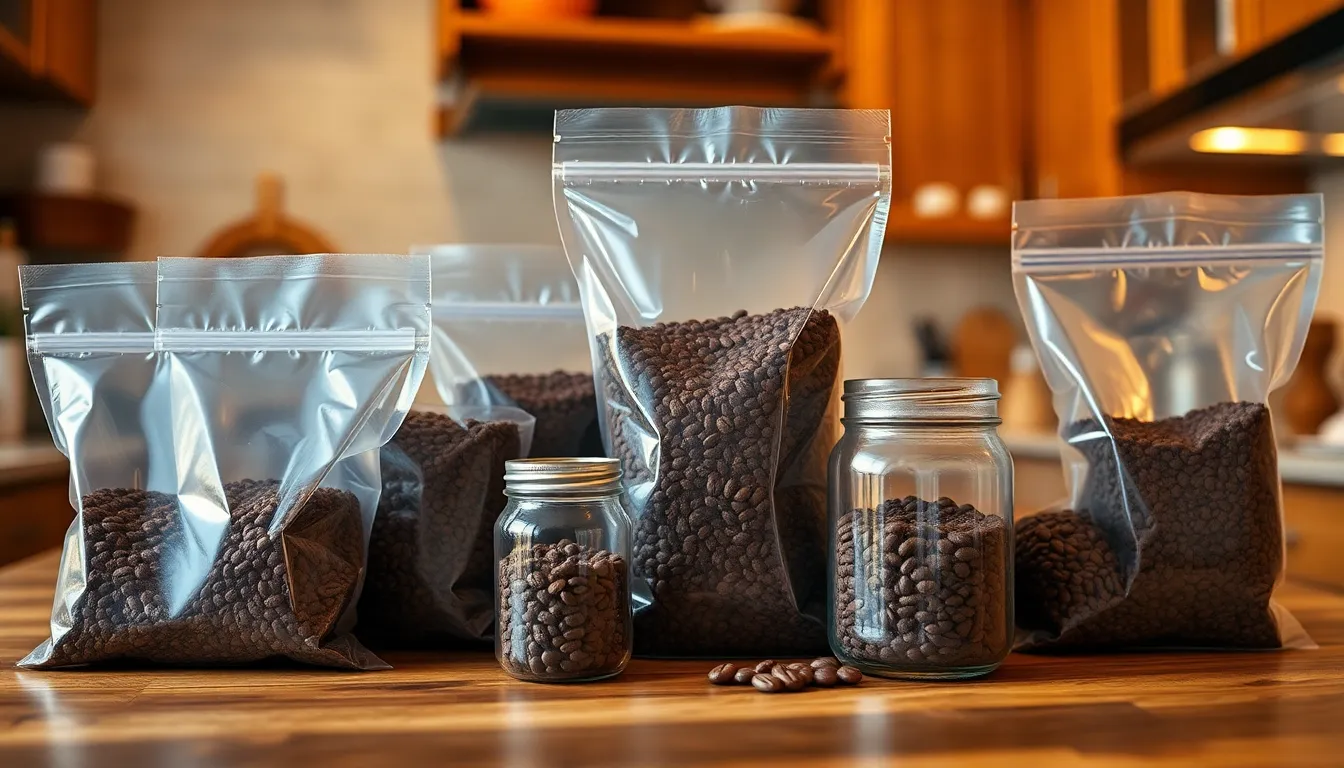Slow Cooker Recipes: Easy Meals, Less Effort!
Family-friendly dishes for busy people — quick prep, delicious results.
Grab yours for $4Can ground coffee be frozen to extend its shelf life? If you’ve ever found yourself with more coffee than you can use before it goes stale, you’re not alone. Freezing ground coffee might be the solution you’ve been looking for to preserve that fresh flavor.
Whether you’re a casual coffee drinker or a dedicated enthusiast, knowing how to properly store your grounds can make a important difference in your daily brew. Freezing coffee has sparked debate among coffee connoisseurs, with some swearing by the method while others caution against it. Let’s explore whether freezing ground coffee is really a good idea and how it affects quality, flavor, and aroma.
The Debate Around Freezing Ground Coffee
Coffee experts remain divided on the practice of freezing ground coffee. Some professionals maintain that freezing damages the coffee’s cellular structure, while others advocate for it as an effective preservation method. This ongoing disagreement has left many coffee enthusiasts confused about the best approach for storing their precious beans.
Professional baristas who oppose freezing often cite concerns about moisture and odor absorption. Ground coffee acts like a sponge, readily absorbing nearby scents which can alter its flavor profile. Renowned coffee consultant James Hoffman suggests that freezing might introduce unwanted moisture during the thawing process, potentially deteriorating the coffee’s quality.
Conversely, freezing proponents point to scientific evidence supporting their position. Research from the University of Bath demonstrated that storing coffee at lower temperatures significantly slows down the oxidation process responsible for staleness. Coffee expert Scott Rao has documented successful experiments freezing high-quality coffee for months with minimal degradation in flavor.
Home brewers report mixed experiences with frozen coffee. Many find that properly sealed and frozen ground coffee maintains acceptable flavor for 3-4 months, while others detect subtle changes in taste after just a few weeks. These varying results likely stem from differences in packaging methods, freezer conditions, and individual sensitivity to flavor changes.
The specialty coffee industry tends to recommend against freezing pre-ground coffee when possible. The National Coffee Association suggests that whole beans store better in freezing conditions than ground coffee due to their reduced surface area. For pre-ground coffee, they recommend using airtight containers and consuming it within two weeks for optimal flavor.
Even though the ongoing debate, both sides agree on certain principles: minimizing air exposure, preventing moisture contact, and using appropriate containers are essential regardless of your storage method. Coffee expert Rikki Manny once conducted a blind taste test with clients using fresh, refrigerated, and frozen coffee samples. Interestingly, while the participants could detect differences, many couldn’t definitively identify which sample had been frozen.
Benefits of Freezing Ground Coffee
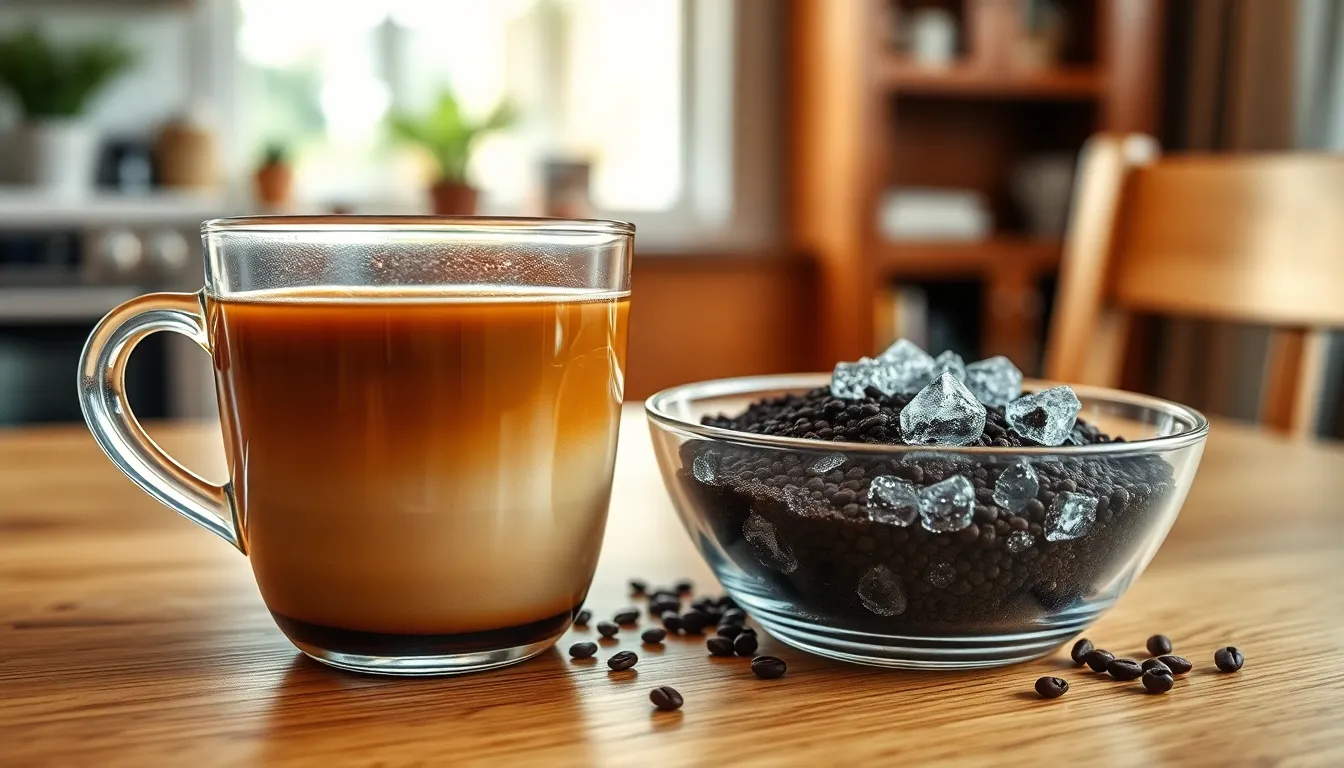
Freezing ground coffee offers important advantages for coffee lovers looking to maintain quality and flavor over time. Scientific evidence supports freezing as an effective preservation method when done correctly.
Preserving Freshness
Freezing dramatically slows the chemical reactions that cause coffee to lose its distinctive aroma and flavor. According to the Arrhenius equation, reducing temperature by 10°C cuts reaction rates by approximately half. At typical freezer temperatures (-20°C), the deterioration process slows roughly 16 times compared to room temperature storage. This temperature reduction significantly decreases the volatilization of aromatic compounds, helping your coffee maintain its original flavor profile much longer. The freezing process essentially “stops the clock” on the staling process, preserving the integrity of your coffee’s unique characteristics.
Extending Shelf Life
Your ground coffee’s shelf life increases substantially when properly frozen. Freezing effectively prevents oxidation—a primary cause of staleness—by minimizing oxygen exposure and halting aging reactions. This preservation method can extend your coffee’s usability by several months beyond standard room temperature storage. For bulk coffee buyers, freezing provides a practical solution for long-term storage without quality degradation. To maximize these benefits, store your coffee in vacuum-sealed or airtight containers to prevent moisture absorption, freezer burn, and odor contamination. The scientific evidence clearly shows that with proper sealing and storage techniques, frozen ground coffee maintains its freshness and quality for significantly longer periods.
Potential Drawbacks of Freezing Coffee
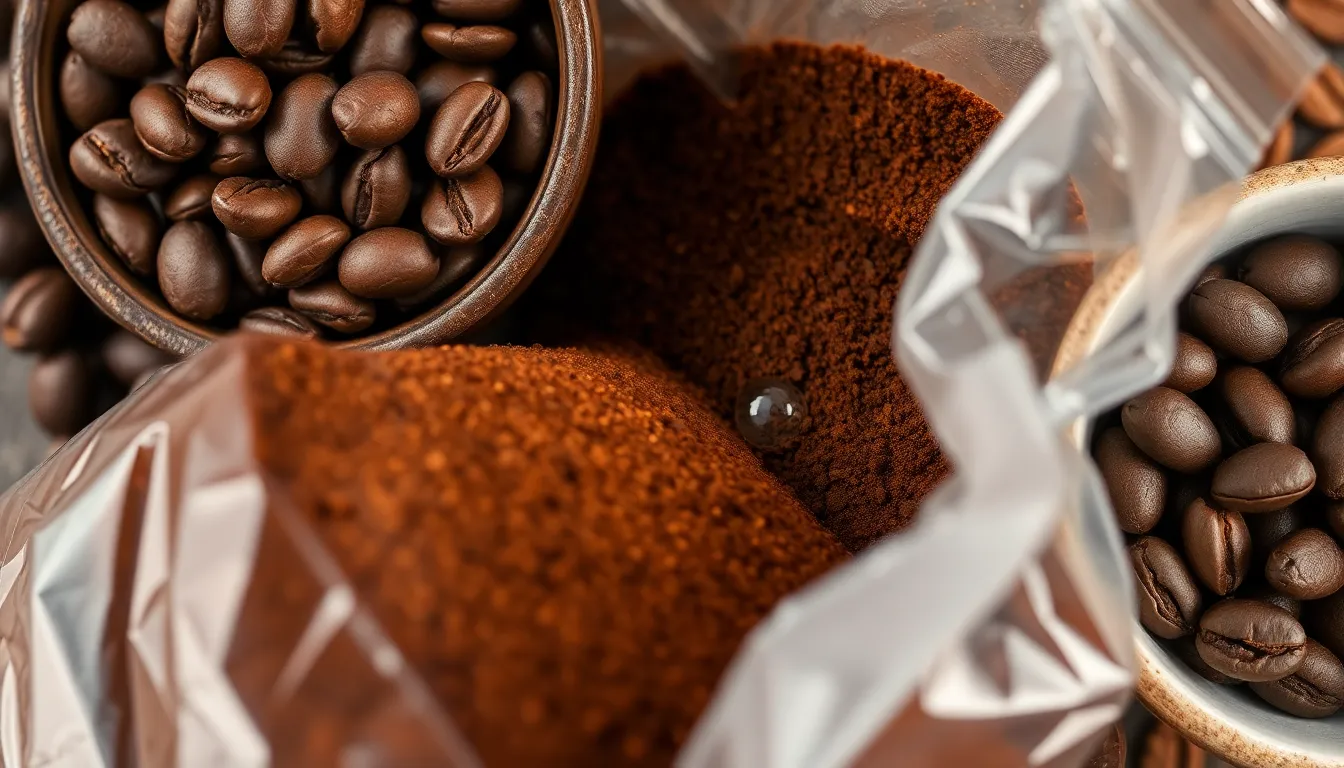
While freezing ground coffee effectively preserves freshness, it comes with several notable disadvantages that can impact your coffee’s quality. Understanding these drawbacks helps you make informed decisions about whether freezing is right for your coffee storage needs.
Moisture and Odor Absorption
Ground coffee absorbs moisture rapidly when exposed to temperature fluctuations. Each time you remove coffee from the freezer, condensation forms inside the packaging due to the temperature difference, introducing unwanted moisture that degrades coffee quality and accelerates the staling process. The porous nature of coffee grounds makes them particularly susceptible to absorbing odors from other frozen foods. Your carefully selected coffee beans might unexpectedly take on flavors from nearby garlic, prepared meals, or other aromatic items stored in your freezer, significantly altering the intended taste profile.
Flavor Changes
Repeated freezing and thawing cycles damage the cellular structure of coffee grounds. This structural breakdown causes essential oils responsible for aroma and flavor to dissipate, resulting in noticeable taste deterioration. The Arrhenius equation demonstrates that while freezing slows chemical reactions that cause staleness, the physical damage from temperature cycling counteracts this benefit. Coffee’s complex flavor compounds undergo alterations during the freezing process, potentially diminishing the nuanced notes and characteristics that make your preferred coffee unique. The cellular damage affects extraction during brewing, potentially leading to inconsistent results compared to fresh, unfrozen grounds.
How to Properly Freeze Ground Coffee
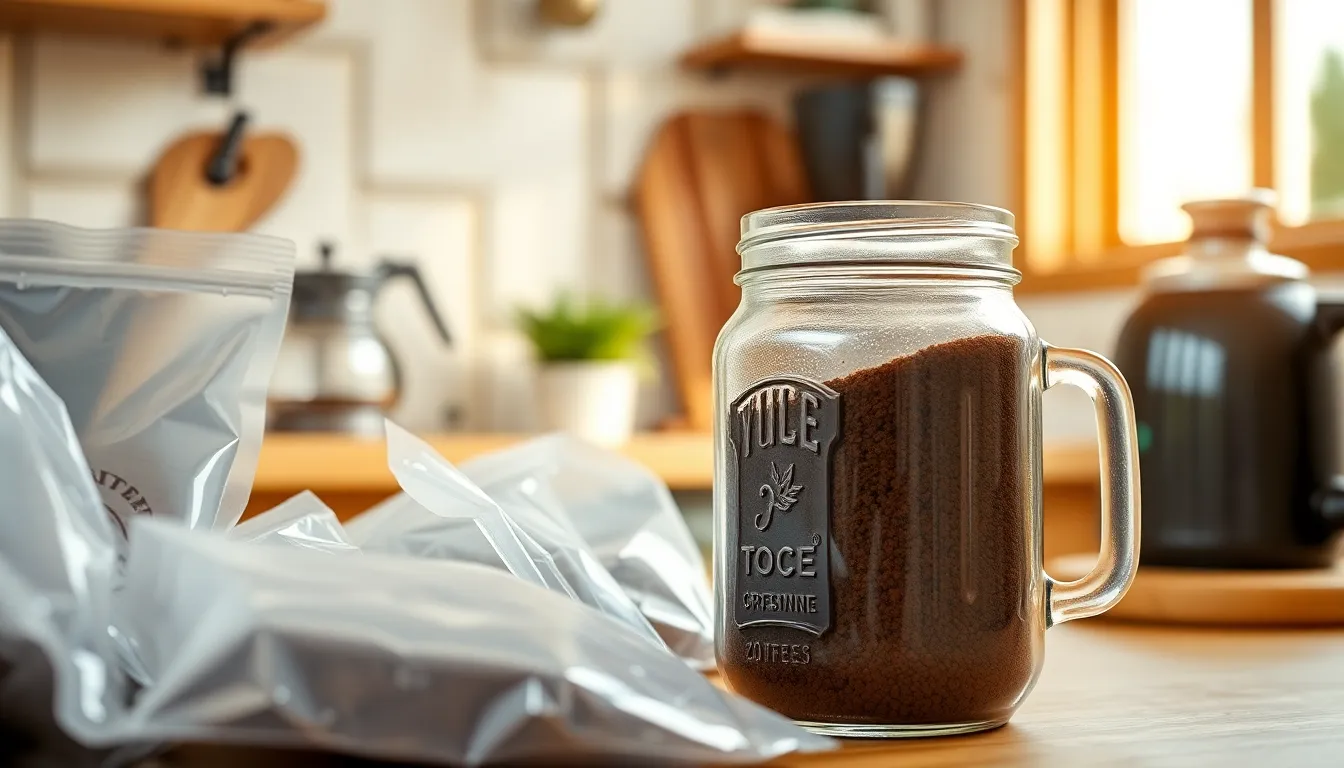
Freezing ground coffee extends its shelf life when done correctly, preserving flavors that would otherwise deteriorate at room temperature. Following these exact techniques ensures your coffee maintains its quality throughout the freezing process.
Suitable Containers for Freezing
The right container makes all the difference when freezing ground coffee. Original packaging works well if it’s unopened and vacuum-sealed, providing an effective barrier against moisture and air. Vacuum-sealed bags offer superior protection by removing air completely and creating a strong barrier against both moisture and odors from your freezer. Airtight containers like mason jars or specialized coffee canisters serve as good alternatives when vacuum sealing isn’t an option, though you’ll need to ensure they’re sealed tightly to minimize air exposure. Many coffee enthusiasts find that double-bagging their ground coffee in freezer-safe ziplock bags removes excess air and provides an additional layer of protection against freezer odors.
Portioning for Convenience
Breaking down your coffee supply into smaller amounts saves time and preserves flavor. Dividing ground coffee into portions that match your typical brewing amounts prevents the need to thaw and refreeze larger batches, which accelerates flavor loss with each cycle. Labeling each portion with the freezing date helps you track freshness and use the oldest coffee first, ideally within one to two months for optimal flavor retention. Coffee can technically remain frozen for up to a year without spoiling, though quality gradually diminishes over time. Daily coffee drinkers benefit from creating weekly portions, while occasional drinkers might prefer single-serving packets that thaw quickly when needed. This system eliminates waste and ensures you’re always brewing coffee at its best possible quality even though being frozen.
Best Practices for Thawing Frozen Coffee
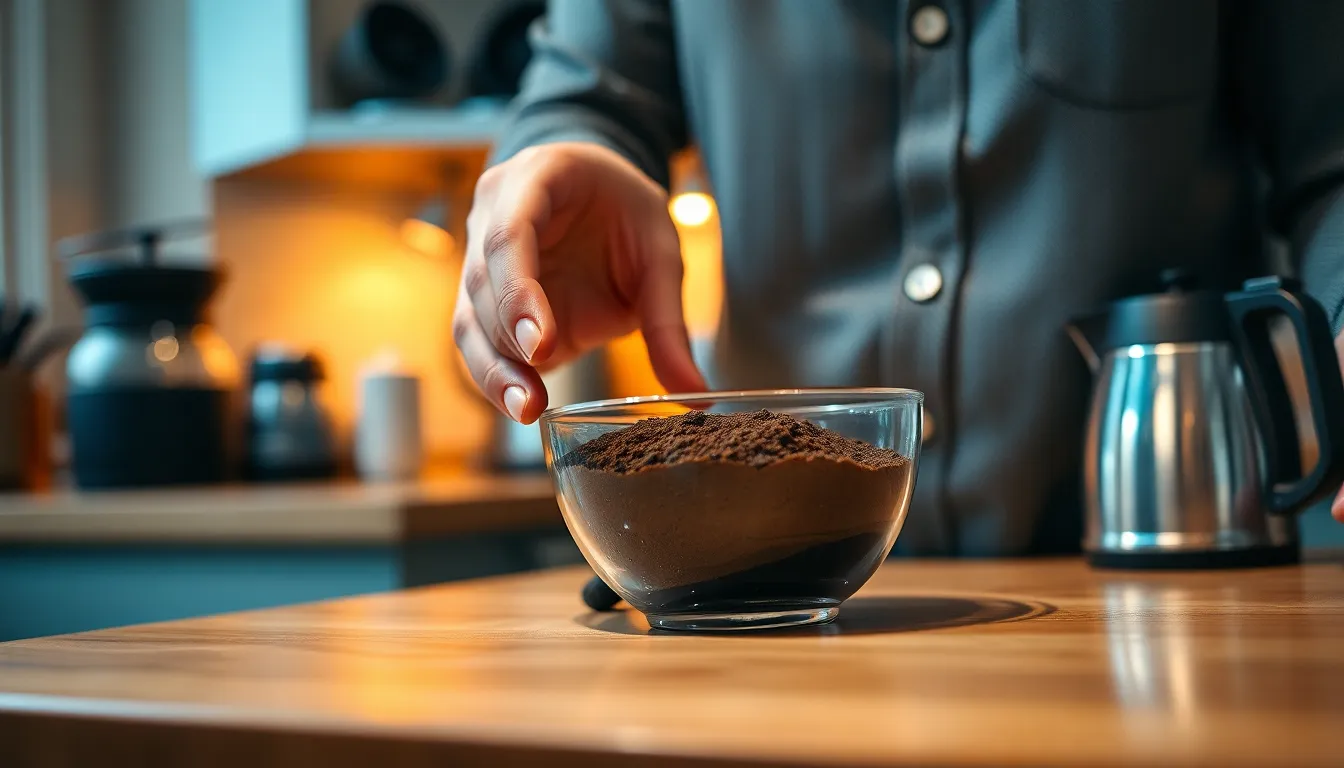
Thawing frozen ground coffee properly preserves its flavor profile and brewing quality. Gradual defrosting in the refrigerator overnight yields the best results, allowing the coffee to warm slowly without developing condensation that can compromise taste. This method maintains the coffee’s integrity by preventing rapid temperature changes that might introduce unwanted moisture.
For those short on time, microwave defrosting offers a quicker alternative. Set your microwave to defrost and warm the coffee in brief 15-second intervals to avoid overheating. Excessive heat can damage the volatile compounds responsible for coffee’s distinctive aroma and flavor notes.
Temperature equilibration before brewing is crucial for optimal extraction. Allow your thawed coffee grounds to reach room temperature completely before brewing. This extra patience pays off by preventing condensation from forming when hot water hits cold grounds, which can lead to uneven extraction and subpar flavor development.
Avoid repeatedly freezing and thawing the same batch of coffee. Each temperature cycle degrades quality and accelerates the loss of essential oils. This is why portioning your ground coffee before freezing makes such a difference in maintaining consistent brewing results over time.
Alternatives to Freezing Ground Coffee
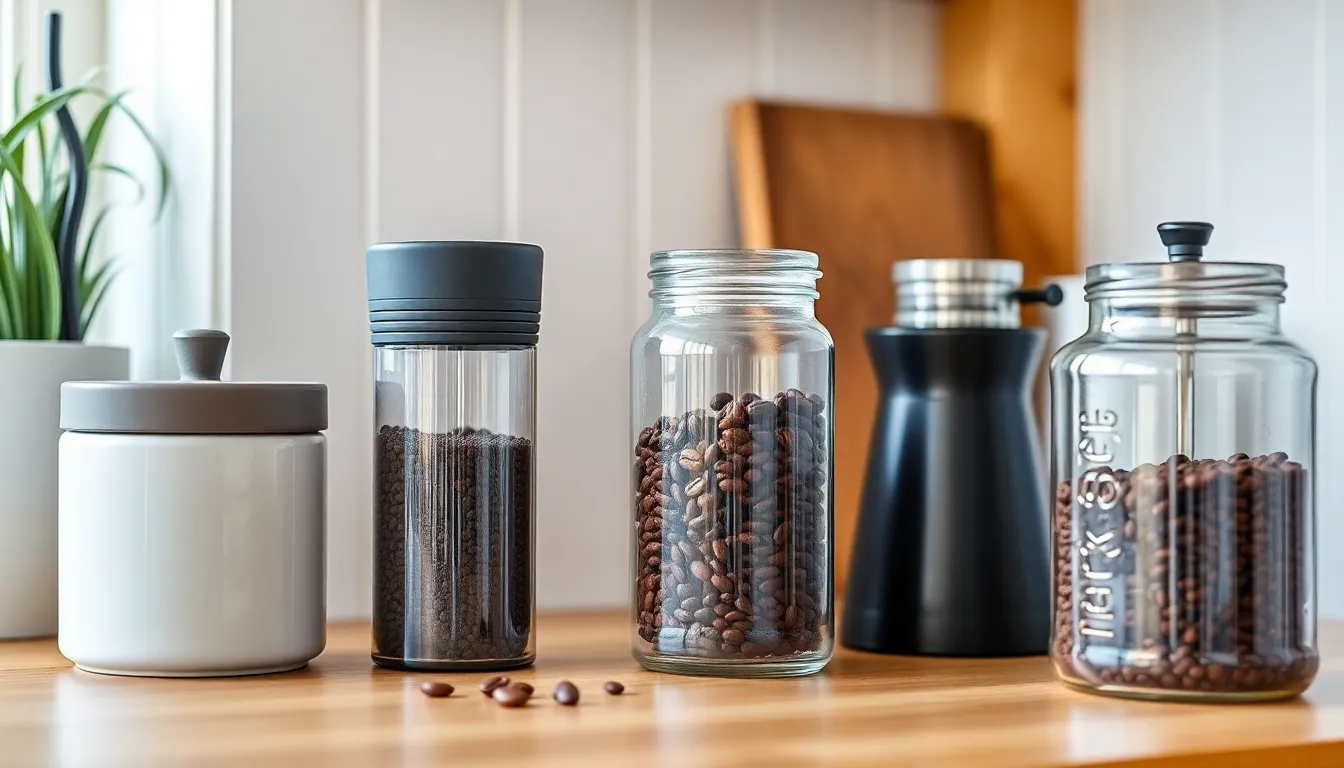
Room Temperature Storage
Room temperature storage offers a convenient option for preserving coffee quality without freezing. Airtight containers placed in cool, dark, and dry locations protect your coffee from its primary enemies: oxygen, light, heat, and moisture. Many coffee experts recommend consuming ground coffee within two weeks of opening for optimal flavor experience. Premium ceramic or opaque glass containers with secure seals prevent unwanted air exposure while maintaining freshness longer than standard packaging.
Coffee Subscription Services
Coffee subscription services deliver freshly roasted and ground coffee at regular intervals matched to your consumption rate. These services eliminate the need for long-term storage answers by providing just enough coffee to last until your next delivery arrives. Subscribers typically receive coffee within days of roasting, ensuring peak flavor without freezing or specialized storage. Many subscription companies offer customization options based on your brewing methods, flavor preferences, and consumption patterns.
Grinding Beans As Needed
Grinding beans just before brewing represents the gold standard for coffee freshness preservation. Whole coffee beans naturally retain their flavors and aromas longer than pre-ground coffee due to their smaller surface area exposed to oxygen. A quality burr grinder allows you to prepare exactly the amount needed for each brewing session, eliminating storage concerns altogether. Coffee connoisseurs universally agree that fresh-ground beans produce superior flavor profiles compared to pre-ground coffee stored by any method.
Vacuum Sealing Systems
Vacuum sealing technology creates an oxygen-free environment that dramatically extends ground coffee’s shelf life without freezing. Commercial vacuum sealers remove air from storage bags or containers, preventing oxidation that causes coffee to become stale. Vacuum-sealed ground coffee maintains its freshness for 3-6 months when stored in a cool, dark cupboard. This method preserves coffee’s aromatic compounds effectively while requiring less space than freezer storage and avoiding potential moisture issues associated with freezing.
Smaller, More Frequent Purchases
Buying smaller quantities of coffee more frequently eliminates long-term storage challenges entirely. Local coffee shops and roasters offer freshly ground coffee in quantities that match your weekly consumption patterns. This approach ensures you’re always brewing with recently ground coffee without managing complex storage systems. Coffee purchased in smaller amounts typically costs slightly more per ounce but delivers significantly better flavor than larger quantities stored for extended periods.
Conclusion
Freezing ground coffee can be an effective preservation method when done properly. The key is using airtight containers to prevent moisture and odor absorption while portioning your coffee to avoid repeated freeze-thaw cycles.
While freezing extends shelf life by slowing oxidation the specialty coffee industry still generally favors using whole beans over pre-ground coffee for freezing. You’ll get the best results by properly thawing your frozen grounds at room temperature before brewing.
For truly exceptional coffee consider alternatives like vacuum sealing grinding beans as needed or simply purchasing smaller quantities more frequently. Whatever method you choose proper storage fundamentals remain essential: minimize air exposure prevent moisture contact and use appropriate containers to enjoy your coffee at its best.
Frequently Asked Questions
Is freezing ground coffee a good way to preserve freshness?
Yes, freezing ground coffee can effectively preserve freshness when done properly. Scientific research shows that lower temperatures significantly slow down the oxidation process that causes coffee to go stale. For best results, use airtight, vacuum-sealed containers to prevent moisture and odor contamination. Properly frozen ground coffee can remain fresh for several months longer than coffee stored at room temperature.
How long does frozen ground coffee stay fresh?
Properly stored frozen ground coffee can maintain good quality for 1-2 months for optimal flavor, though it remains safe to use for up to a year. The quality gradually diminishes over time. For best results, portion coffee into small amounts before freezing, label with the date, and use airtight containers to protect against moisture and freezer odors.
What containers should I use to freeze coffee grounds?
Use unopened vacuum-sealed packaging, vacuum-sealed bags, or airtight containers like mason jars with tight-fitting lids. The key is selecting containers that completely seal out air and moisture. Glass containers are preferable to plastic as they don’t transfer odors. Portion your coffee into smaller amounts that you can use within a few days after thawing to avoid repeated freezing and thawing.
Does freezing affect the taste of ground coffee?
Freezing can affect taste, but proper storage minimizes negative impacts. Coffee’s cellular structure can be damaged by repeated freezing and thawing, causing essential oils to dissipate. Additionally, ground coffee easily absorbs moisture and odors when temperature fluctuates. However, when stored correctly in airtight containers and thawed properly, many coffee drinkers report minimal taste differences compared to fresh grounds.
What’s the best way to thaw frozen coffee grounds?
Allow frozen coffee to thaw gradually in the refrigerator overnight to prevent condensation. Alternatively, thaw at room temperature for several hours in a sealed container. Never open the container until the coffee has fully reached room temperature to prevent moisture from condensing on the cold grounds. Avoid repeatedly freezing and thawing the same batch as each temperature cycle degrades quality.
Are there better alternatives to freezing ground coffee?
Several alternatives may work better depending on your coffee habits. Consider storing coffee at room temperature in airtight containers (use within two weeks), subscribing to a coffee delivery service for regular fresh shipments, grinding beans as needed instead of all at once, using vacuum sealing systems, or simply buying smaller quantities more frequently to ensure you always have fresh coffee without long-term storage.
Can pre-ground coffee and whole beans both be frozen?
Whole beans generally freeze better than pre-ground coffee. The increased surface area of ground coffee makes it more susceptible to moisture absorption and faster degradation of flavor compounds. If you must freeze ground coffee, ensure it’s in completely airtight containers. For best results, store whole beans in the freezer and grind only what you need just before brewing.
How can I tell if my frozen coffee has gone bad?
Frozen coffee rarely “goes bad” in terms of food safety, but quality deteriorates over time. Signs of quality loss include diminished aroma when grinding or brewing, flat or stale flavor, or visible moisture inside the storage container. If your coffee has absorbed freezer odors or tastes noticeably different from fresh coffee, it’s past its prime though still safe to consume.

